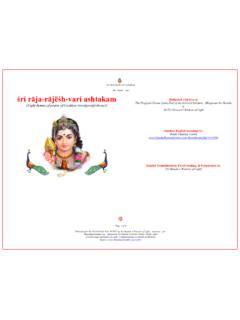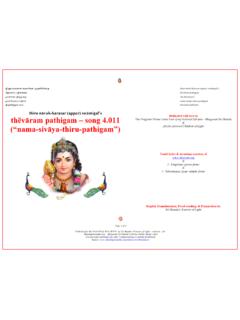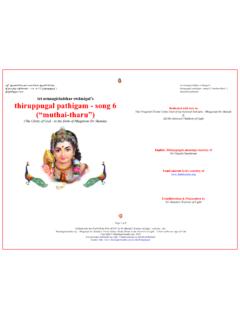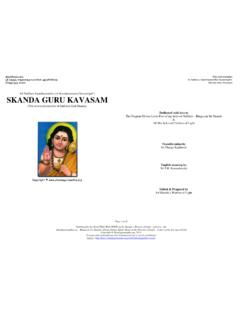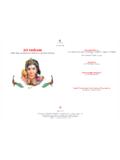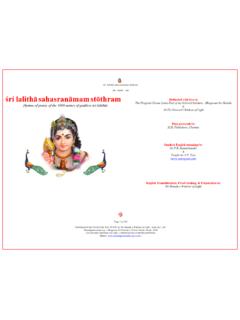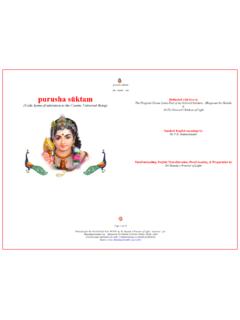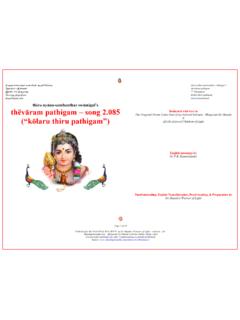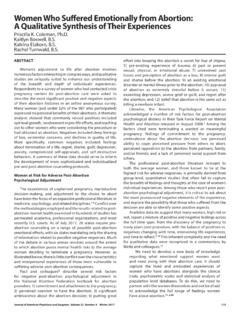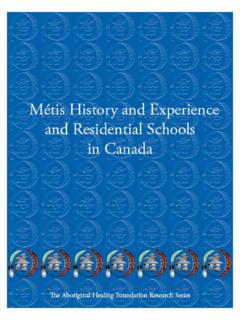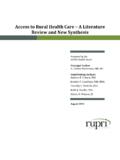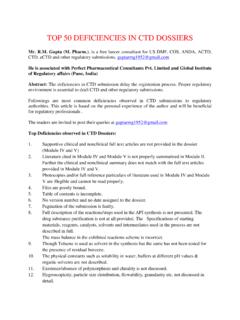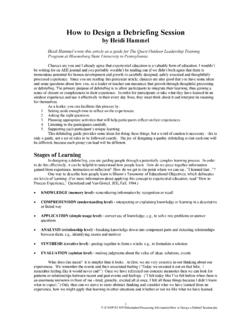Transcription of rí arunagirin thar sw migal’s கந்தர் அதி …
1 R arunagirin thar sw migal s kanthar anubh thi thiruchitrambalam r arunagirin thar sw migal s kanthar anubh thi (God- experience of Bhagavan Sri Skanda) 3rd edition Copyright 2008, 2009, 2010 by Dedicated with love to The Fragrant Divine Lotus Feet of my beloved SatGuru - Bhagavan Sri Skanda & All His Beloved Children of Light English meanings by Sri Karthikeyan Adopted from Kanthar Anubhuti (God- experience ) of Saint Arunagirinathar. 2nd ed. (By Karthikeyan) Tamil unicoding, Transliteration, Proof-reading & Preparation by Sri Skanda's Warrior of Light Page 1 of 28 Published for the World Wide Web (WWW) by Sri Skanda's Warrior of Light - with love - for: Bhagavan Sri Skanda s Divine Online Abode (Home to the Warriors of Light Ushers of the new age of God) Copyright , 2014.
2 For personal (spiritual) use only. Commercial use is strictly prohibited. Source: r arunagirin thar sw migal s kanthar anubh thi thiruchitrambalam Page 2 of 28 Published for the World Wide Web (WWW) by Sri Skanda's Warrior of Light - with love - for: Bhagavan Sri Skanda s Divine Online Abode (Home to the Warriors of Light Ushers of the new age of God) Copyright , 2014. For personal (spiritual) use only. Commercial use is strictly prohibited. Source: TABLE OF CONTENTS Page # Kanthar Anubh thi - Introducton 3 Guide to pronunciation 6 Kanthar Anubh thi 7 (Tamil) Kanthar Anubh thi 14 (English) References 28 r arunagirin thar sw migal s kanthar anubh thi thiruchitrambalam Page 3 of 28 Published for the World Wide Web (WWW) by Sri Skanda's Warrior of Light - with love - for: Bhagavan Sri Skanda s Divine Online Abode (Home to the Warriors of Light Ushers of the new age of God) Copyright , 2014.
3 For personal (spiritual) use only. Commercial use is strictly prohibited. Source: r arunagirin thar sw migal s kanthar anubh thi (introduction) By Sri Karthikeyan Kanthar Anubhuthi is a deeply philosophical and spiritual treatise, with profound mystical import of Saint arunagirin thar, who stands unique among the devotee-saints of the Tamil Nadu. Kanthar Anubhuthi is a work of 51 verses. It is held in high esteem as a Mantra-Sastra and as the crowning glory of Sri arunagirin thar's works, because of its high spiritual value and depth. The verses are short, rather the smallest in all the works of arunagirin thar, but they are the most sublime. As the title suggests, it is a work on (the attainment of) God- experience . There are certain editions of the Kandar Anubhuthi with 100 verses, but the last 49 verses are generally rejected as later additions by someone and not Arunagiri's words.
4 "Kantha," in Tamil, is "Skanda" in Sanskrit; it is one of the Names of the spiritual Son of Lord Siva. Some of His other names being: Shanmukha, Karttikeya, Guhan, Velayudhan, Murugan, etc. He is the younger brother of Lord Sri Ganesha. "Anubhuthi," is rather a Sanskrit term used in the Tamil language as well in the same sense, , direct or immediate experience of God, and it denotes the spiritual union of the soul with God. It usually implies the highest non-dual or Advaitic realization. It is Sakshatkara or direct experience . Hence, Kanthar Anubhuthi would mean the Immediate or Direct Divine experience of Lord Skanda. And, to arunagirin thar, Lord Skanda is not merely a personal deity or Ishta Devata but the Supreme Absolute Itself, as he himself reveals in many verses, particularly in verses 2, 13, 28, and 49. Hence, we may say that "Kanthar Anubhuthi" means, in simple terms, "God experience .
5 " Saint arunagirin thar is the author of many poetic works of which the Kanthar Anubhuthi is his masterpiece. Though it is a small work of 51 verses or stanzas, it is very rich in spiritual wisdom and is full of deep significance. It is a treasure of rare knowledge to seekers of Truth and a mine of devotion to lovers of God. It is an unusual work of a mysterious synthesis of Bakthi and Jnana, of devotion and knowledge - the one overlapping the other; at once touching the heart and igniting pure emotions as well as provoking deep thought and transcending the intellect. Suffice it to say that it is regarded as a Mantra-Sastra or a treatise of mystic imports and has been placed on par with the well-known Mantra-Sastra of Thirumanthiram - a treatise of 3,000 verses of Saint Thirumular, who used to remain absorbed in Samadhi for one full year, only to rise from it to give one verse and remain absorbed again.
6 The Thirumanthiram is the 10th book of the Panniru Thirumurai (the 12 sacred Saiva works) of the Saivaites. Correspondingly, the Kanthar Anubhuthi is regarded as the 10th book of the Panniru Thirumurai of the followers of Lord Murugan. Thus, the glory and greatness of the work can be understood in a measure, though to realize it in full measure it has to enter into one's being and become part of one's own experience . It is rightly believed that the work Kanthar Anubhuthi contains itself, explicitly and implicitly, many Mantras. The Names of the Lord, such as Murugan, Kanda, Shanmukha, Guhan, Velava, are Mantras by themselves; and the work is replete with these Names of the Lord. Further, in many verses there are Mantras in the form of mystic formulae. For instance, "Velum Mayilum Thunai" in verse 1, "Naatha Kumaraa Namah" in verse 36, "(Naan) Iraiyoon Parivaaram" in verse 37, "Guruvaai Varuvaai Arulvaii Guhanae" in verse 51 - the details about which can be found in the explanations of the verses.
7 There is also another reason why the Kanthar Anubhuthi is r arunagirin thar sw migal s kanthar anubh thi thiruchitrambalam Page 4 of 28 Published for the World Wide Web (WWW) by Sri Skanda's Warrior of Light - with love - for: Bhagavan Sri Skanda s Divine Online Abode (Home to the Warriors of Light Ushers of the new age of God) Copyright , 2014. For personal (spiritual) use only. Commercial use is strictly prohibited. Source: regarded as a Mantra-Sastra. "Mananaat Trayate Iti Mantra" - that by the Manana or reflection of which one is saved or released (from Samsara) is a Mantra. Truly, a deep reflection and meditation on this mystic work and its imports liberates one from bondage. The Vel of Lord Skanda, which is identical with Him, is a mystic Divine weapon with which He destroyed the Asuras.
8 The Vel which is Wisdom-Absolute also annihilates the inner Asuras or enemies of Avidya, Kama, and Karma, and liberates the Jiva from transmigration. The Vel is a mysterious divine power and is referred to by Saint Arunagirinaathar as the Mantra-Vel in one of his Thiruppugal songs. And, out of the 51 verses of the Kanthar Anubhuthi, there is a direct invocation to the Vel in 25 verses. For this reason as well, the work is regarded as a Mantra-Sastra. Thus, being replete with the Names of the Lord, which are Mantras; containing may mystic formulae (Mantras) in its bosom, a reflection or repetition of which liberates one from Samsara; being filled with invocations to the Vel which is mystic in nature, which destroys Avidya; a daily recitation of this marvellous Mantra-Sastra, the Kanthar Anubhuthi, is capable of bestowing on one whatever one honestly seeks and exactly in the manner one seeks.
9 Hence, to the devotees of Lord Skanda, the Kanthar Anubhuthi is a holy book for daily Parayana or devout recitation and there are devotees even today who can narrate their personal experiences and the miraculous protection received by them from the Lord by resorting to the repetition of a single verse or even a part of a verse from the Kanthar Anubhuthi. We may, in passing, refer to one or two such instances. (1) A devotee, who used to do daily Parayana of the Kanthar Anubhuthi, was proceeding from one village to another through a jungle-path. He was suddenly accosted by a thief. The devotee plucked the stem of a betel leaf which he was carrying and uttering the phrase "Tholaipatturuvath Thodu Velavanae", meaning: "O Lord Velayudha, who dispatched the Vel as to pierce (through the heart of the Asura Surapadma)" (last line of verse 4), shot it on the thief. Lo! The betel stem acted as the Vel and killed the thief on the spot.
10 (2) The Saiva Siddhanta Maha Samajam, Madras, has published a book entitled "Kanthar Anubhuthi", in Tamil, with the original verses, their respective Yantras or Chakras and Mula-Mantras. Its author is Sri Thyagaraja Mudaliar, , who was the Assistant Secretary of the Samajam. He was initiated into the verses and the Yantras by a Sannyasin who had attained great Siddhis in them and to whom the Yantras and Mula-Mantras were revealed in meditation. The author has narrated an interesting incident in his book, as follows: It was in the year 1956. An America, Mr. Edward James, was doing Devi Upasana and had some obstacles in his practices. He wrote from America to the revered Mudaliar to suggest some means to overcome the obstacles. In his reply, Sri Mudaliar hinted at the need for invoking Lord Ganesha's grace to overcome the obstacles and advised him to repeat the first verse of the Kanthar Anubhuthi (Aadumpari ) together with its Mula-Mantra and Yantra.
